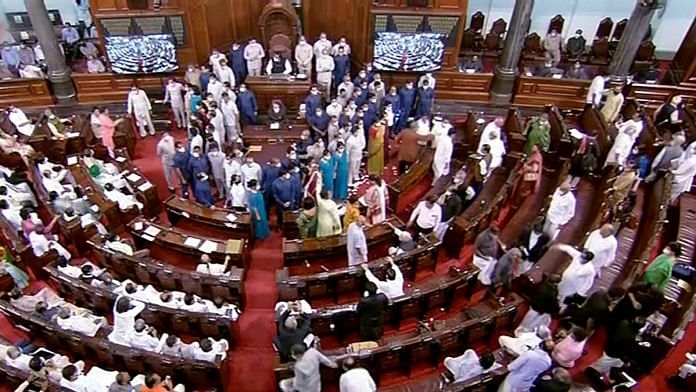The Monsoon Session of Parliament this pandemic year saw the executive turn crisis into opportunity by bending rules, drastically cutting session hours and rushing through legislation. The trend continues unabated so much that it seems that the Narendra Modi government has mistaken speed for efficiency. There have been ceaseless efforts by the ruling Bharatiya Janata Party to play down the role of the opposition front. The BJP has gone so far as to portray the opposition as rival contenders of power instead of active participants in the democratic polity. For quite a long time, politicking in India had been more or less a slugfest between the treasury bench and the opposition bench. This has cost us dearly, both democratically as well as financially.
The Modi government especially has been exploiting the various loopholes in the system, of which there are quite a few, to push forth their agenda. The protests during the Monsoon Session that ate up a significant chunk of parliamentary hours were necessitated by the government’s reluctance to engage with the opposition on the Pegasus spyware issue.
The protesting MPs have been portrayed as disruptors and the protest itself trivialised and termed a political ploy. In this post-truth era, where public perception of the government determines electoral outcomes, the portrayal of people’s representatives as miscreants is debilitative to the democratic process.
Also read: Parliament worked 49 hours, wasted 151 hours — monsoon session was least productive in Modi 2.0
Opposition as powerful as govt
Parliamentary democracy is characterised by a system of mutual accountability and a much-crucial deliberative process. The legislature is constitutionally obliged to hold the executive accountable. This is what sets it apart from the presidential system where there is a visible concentration of power and greater opacity in governance. The opposition front recognises this, in fact, even more than the government.
The British system, upon which India’s parliamentary system is modelled, has a pliant opposition called “Her Majesty’s Loyal Opposition”. Here the idea is that the sovereign’s right to the throne may not be challenged by the opposition but governmental policies may be scrutinised. This makes complete sense in a constitutional monarchy. But one of the defining features of the Indian variant is that no such immunity is available to the Prime Minister or their cabinet. In short, theoretically, at least, the opposition is as powerful as the government. Cooperation between the government and the opposition gives credence to the system.
As a polity following the ‘first past the post’ system of voting, the role of the opposition is especially significant. It is noteworthy that even if we assume fair electioneering by political behemoths, a vast majority of the populace continues to be ruled by a party/front they said a vehement ‘no’ to. This emphasises the need for a strong opposition with a resolute allegiance to the people.
Also read: TMC, Congress, 12 other parties meet to evolve joint strategy on Pegasus, other issues
Role of opposition today
A weak opposition is, in my opinion, far more perilous than a weak government. It goes without saying that an irresponsible government in combination with a timid opposition spells doom. The proliferation of the Hindutva BJP was, in a way, facilitated by a dysfunctional opposition. Moreover, numerous academic papers cite the emergence of a strong Right-wing as one of the primary forces that have led to the destruction of the parliamentary system. In this manner, it becomes a vicious cycle that needs to be combatted.
The BJP’s current policies with overt and covert attempts at destroying federalist principles and centralising power can be resisted only through the participation of regionally strong opposition parties. Such parties introduce a regional lens through which to analyse policymaking at the central level to ensure representation of geographically disparate sections. Their role is also important in breaking pre-existing vote banks and overhauling age-old voting trends. This will also prove vital in dissolving, instead of shifting, power centres concentrated in specific states.
The farmer protest represents, to a large extent, the disenchantment of one of BJP’s core voter bases, namely the Hindi heartland with the Union government and heralds the ushering in of a new era in Indian politics built on anti-Modi-Shah sentiments. This reverses the trend that originally brought the National Democratic Alliance to power. The duo represents the centralisation that is deeply unconstitutional as well as against the ethos of parliamentary democracy.
However, despite the outward show of confidence, it is obvious that, of late, on the inside, BJP is a little shaken. It has been made clear that an authoritarian system cannot prevail for long. The unchecked use of muscle and money power in the Bengal elections by the BJP yielded nothing; it should now be clear to the party that the opposition parties are forces to reckon with. Hence, the opposition will continue to fight and resist this destruction of parliamentary democracy and keep asserting its power, as a rightful and equal participant in the process of law-making.
Nadimul Haque is Rajya Sabha MP from TMC. Views are personal.
(Edited by Neera Majumdar)



